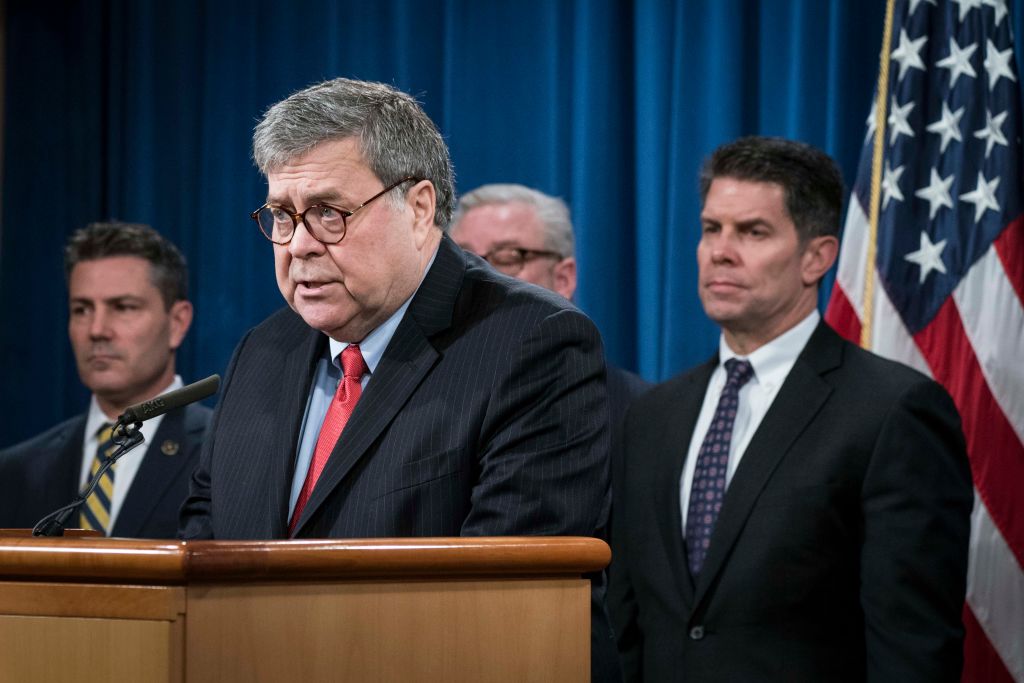Coronavirus scammers will be prosecuted ASAP, U.S. attorney general says

Attorney General of the United States William P. Barr has ordered federal prosecutors to throw the book at cybercriminals and fake-cure peddlers who are taking advantage of the coronavirus crisis.
"There have been reports of individuals and businesses selling fake cures for COVID-19 online and engaging in other forms of fraud, reports of phishing emails from entities posing as the World Health Organization or the Centers for Disease Control and Prevention, and reports of malware being being inserted onto mobile apps designed to stop the spread of the virus," Barr wrote in an internal memo Wednesday (March 16).
- Coronavirus maps: Track the outbreak with these interactive dashboards
- Where to buy hand sanitizer: These retailers still have stock
- New: Coronavirus drive-through testing locations: Where to go in your state
"The pandemic is dangerous enough without wrongdoers seeking to profit from public panic and this sort of conduct cannot be tolerated," Barr added. "Every U.S. Attorney's Office is thus hereby directed to prioritize the detection, investigation, and prosecution of all criminal conduct related to the current pandemic."
A copy of Barr's memo was obtained by Cyberscoop and posted online.
Malware and phishing scams related to the coronavirus pandemic first started appearing in late January as the virus began to break out of central China, and the fake-cure shillers started showing up soon afterwards.
Televangelist Jim Bakker, infamous for an extramarital affair and subsequent fraud conviction in the 1980s, has been selling a potion made from silver that he said cures COVID-19. Fringe talk-show host Alex Jones has been promoting a silver-infused toothpaste at $15 a tube that he said "kills the whole SARS-corona family at point-blank range."
More recently, Bitdefender reported yesterday (March 17) that several websites had popped up purporting to sell hand sanitizer, medical face masks, surgical gloves and digital thermometers, some in exchange for bitcoin.
Get instant access to breaking news, the hottest reviews, great deals and helpful tips.
"Purchasing those medical supplies will likely result in receiving squat while giving away your credit card data," Bitdefender's Liviu Arsene wrote in a blog posting.
How to avoid coronavirus scams
To make sure you don't fall for any of these coronavirus scams, remember that there is so far no cure for the disease, and no way to prevent getting it other than by washing your hands and minimizing contact with other people.
Medical supplies are indeed hard to come by, but there's no reason to believe that a website you've never heard of suddenly has a big stock of face masks and hand sanitizer.
Don't believe postings about coronavirus cures and prevention that you see posted on Facebook, Instagram, Twitter or YouTube, and definitely don't follow any links promising more information that appear on those postings.
For reliable up-to-date information on coronavirus, go straight to the websites of the Centers for Disease Control and Prevention (CDC) or the World Health Organization (WHO).
Don't give any money to coronavirus charities that solicit donations through email, social media or text message.
Don't believe emails you may receive that say they come from the CDC or WHO, and don't open attachments on emails that come from other health agencies or local authorities.
Last but not least, install and run some of the best antivirus software on your PC, Mac or Android devices so that you're protected against digital contagions too.

Paul Wagenseil is a senior editor at Tom's Guide focused on security and privacy. He has also been a dishwasher, fry cook, long-haul driver, code monkey and video editor. He's been rooting around in the information-security space for more than 15 years at FoxNews.com, SecurityNewsDaily, TechNewsDaily and Tom's Guide, has presented talks at the ShmooCon, DerbyCon and BSides Las Vegas hacker conferences, shown up in random TV news spots and even moderated a panel discussion at the CEDIA home-technology conference. You can follow his rants on Twitter at @snd_wagenseil.
